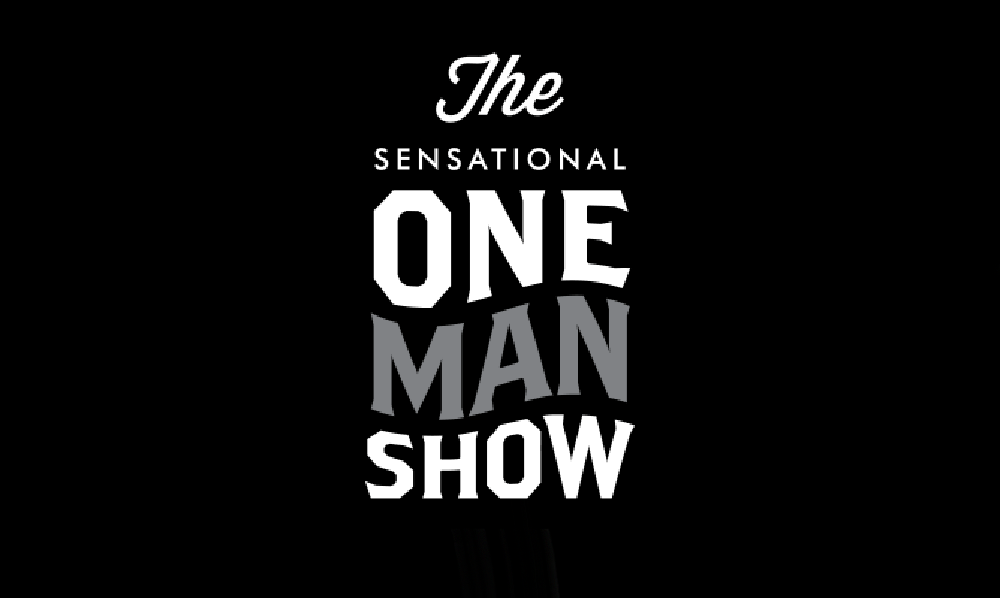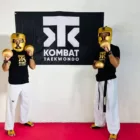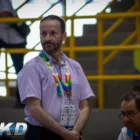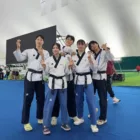The Pan American Taekwondo Union (PATU) was founded in September 1977 by Dr. Un Yong Kim, during the III World Taekwondo Championships held in Chicago, Illinois, USA in 1977. From that moment on, this Continental was presided over by:
- Dan Morrow (USA) 1977 – 1978
- David Revense (USA) 1978 – 1984
- Dong Ja Yang (USA) 1984 – 1991
- Rafi Serrano (Puerto Rico) 1991-1992
- Adalberto Escoto (Dominican Republic) 1992 – 1996
- Cha Sok Park (USA) 1997 – 2007
- Varo Barragan (Panama) 2007 – 2008
- Ji Ho Choi (USA) 2008 – 2020
- Helder Navarro (Colombia) 2020 – 2021
MASTKD ESPAÑOL
As we had to go back to times when MASTKD did not even have a semblance of existence, we had to talked to the protagonists who were part of the different administrations and they all agreed on something: “PATU was never a pluralistic or democratic entity, it was always One-Man Show, although its different presidents wanted to make its Executive Council believe that their suggestions had some weight.
Going to the last part of the story and of which MASTKD has been a close witness, during the administrations of Ji Ho Choi and Helder Navarro, the policies of “leadership” became almost dictatorships, because their work teams did not have a voice guidelines for the highest representative at the time, which for better or worse, ended up tarnishing the name of all, including the Executive Committee.
The few voices that were raised against or simply suggested something different were automatically annulled and marginalized.
Helder Navarro’s term as president of WTPA was supposed to be ephemeral, since it was supposed to end in October in the WTPA elections in Wuxi, China; however, it seems that Navarro’s departure will be through the back door and earlier than expected, after the World Taekwondo intervened the Continental Union for ‘serious governance failures’ and thereby diluted the power of the president.
What was found in the investigation conducted by WT? It is not known yet, but whether it is recent or from the more distant past, let us remember that the Colombian Helder Navarro has been in the continental political leadership of Taekwondo since the 90s.
Eight months after taking office – and although many people smile at him and give him a political hug – the reality is that there were a series of decisions that undermined his relationship as a leader with the MNA’s and his Executive Committee.
1- Law of Supply and Demand
A few weeks after officially taking office, it was in December when Navarro endorsed the implementation of the law of supply and demand in the official allocation of continental events.
The situation generated discomfort in National Federations such as Ecuador or Puerto Rico, after they alleged unequal conditions, since the organizations would be won by the countries with more economic resources and the distribution of tournaments to the highest bidder was put on a silver platter.
The methodology consisted of setting a floor of US$10,000 and a ceiling of US$25,000 for continental tournaments. In plain English, whoever offered the most money got the organization.
The first event to be that he wanted to assign under this modality was the Qualification for the Cali 2021 Youth Pan American Games.
The Dominican Republic was the country that would have been host of the event after offering US$25,000. It was a controversial allocation, but that is another matter.
The issue here is that, following a series of posts by MASTKD, a representative from the Dominican Federation called a team from this media to say that they bid the US$25,000 because they were never notified that they could bid, initially with US$10,000.
Navarro was asked if this was true. There was never any response to the inquiries. This opened the way for different hierarchs to express their confusion on the subject.
2- WTPA Office in Colombia
One of the first announcements Navarro made upon taking office was that he would invest in an office for WTPA in the Economic District of Bogota, Colombia.
He even confirmed to MASTKD -at that time- that the facilities would consist of nine offices and that it was only a matter of days before they would open.
“In the Colombian capital will be the office of the president, an assistant secretary, and the departments of: Archives and Statistics, Legal, Technology and Systems; Accounting; Operating Manuals and Procedure Guides; Methodological Process Support; Tournament and Judging Division; Training; and Relations with Sub-Regional Olympic Sport Organizations,” Navarro indicated in an interview at the beginning of the administration.
The outcome of the aspirations was a resounding no. The initiative was shelved, because the main question was: How is WTPA going to invest in an office for an acting president and then serve as a museum in the event of a change of leadership?
The proposal generated suspicion among the presidents of national federations, who, although they did not say anything officially, commented in different chats that the proposal was very strange.
The main premises of the conversations were always the same: why the eagerness to create this office? How much money was going to be invested? How much was invested in the remodeling that was supposed to have already been done? Among other questions.
3- Confining the Olympians in Korea
The proposal was the work of the High-Performance Committee but supported until the end by Helder Navarro. It was the initiative to send the Pan American Olympic athletes to a camp in South Korea.
The criteria of the specialists warned of several problems such as, for example, that all foreigners arriving in Korea must undergo a 15-day confinement. Can you imagine stopping for 15 days the training of an Olympic athlete on the verge of competing in Tokyo 2020?
Another bullet that raised alarms and generated doubts about the proposal was that usually coaches and physical trainers use the camps in South Korea to tune up the athletes with fights and demands to the maximum, something that a few days before the Olympics could be risky because of the injuries to which the competitors would be exposed.
This was why, delegations such as Canada, Colombia, Dominican Republic, among others, said they would not attend the training camp and it turned out to be a failure so far.
No one understood why the insistence to do the camp; and everyone wondered how such an idea was conceived.
4- Kukkiwon Regional Office
Something that concerned the presidents was the expressed intentions at some point of WTPA to create a regional office to process Kukkiwon certificates.
The Kukkiwon is the international certificate issued from South Korea that certifies that a person’s black belt is internationally recognized. It is charged in dollars and the higher the grade, the higher the price increases.
Although it was never confirmed or denied, the misguided communication on the subject generated discomfort among the presidents of the area, who saw how the initiative -which would use a route through Colombia, outside the national federation- attacked one of the main sources of income that allows them to sustain themselves in times of pandemic.
5- A web page is more important than qualifying for Cali 2021
Several presidents expressed off the record to MASTKD their disagreement because they were told that in a session of the Executive Council the priority was given to the discussion of the creation of a web page for the WTPA and not to fundamental issues of the sports field related, for example, to the Youth Pan American Games Cali 2021.
The discrepancies in criteria arose because a decision on the classification methodologies for Cali 2021 was not yet known, since it was speculated that the event would not be held in the Dominican Republic due to the COVID-19.
Given the importance of the Games and the interest in promoting other matters, the hierarchs said they felt mocked and hoped that the situation would be resolved as soon as possible.
6- Ignoring e-mails
Elvin Landrau and Victor Hugo Quishpe, president of the Puerto Rican and Ecuadorian federation, respectively; made public that they did not receive a response from the interim president of WTPA, Helder Navarro.
Landrau and Quishpe were especially interested in holding an official conversation, as they were the only national leaders to publicly express their opposition to the law of supply and demand for the allocation of continental events.
It was only weeks later, after MASTKD published several times that the presidents had no answers, that Navarro began to acknowledge them.
Apparently, the situation also occurred with other national federations, who preferred not to identify themselves for this article, but they did show that they were telling the truth and did not get an answer.
7-Busting the Ethics and Transparency Committee
The story goes that a member of the WTPA Executive Council suggested the creation of an Ethics and Transparency Committee to clarify doubts about the previous administration led by Ji Ho Choi, which literally ended overnight.
The issue was not of interest to Navarro, and after the rejection, the decision generated frustration among the presidents who believed in the hope sown by Navarro in the initial speech of his administration.
Faced with the refusal to establish the Committee in Panamerica, WT decided to create a Normalization and Accompaniment Committee for the region, which had important findings and after a vote of the Executive Council of the World Taekwondo, it was finally decided to intervene WTPA for ‘serious governance failures’.
8- Announcing receipt of documents to organize the Pan American Championships and forgetting Costa Rica
One of the most unusual mistakes of the Navarro-Carriazo administration is that it announced the receipt of documents for countries interested in organizing the G4 Pan American Championships.
The detail was that the tournament, mainly agreed for 2020 and postponed for 2021 due to the COVID-19 Coronavirus, already had a host country assigned. It was Costa Rica.
Before the announcement made by the leader of WTPA, the president of the Costa Rican Taekwondo Federation, Wilmar Alvarado, said he was taken by surprise and that he would try to communicate with Navarro because he was violating an agreement he already had with WTPA.
In the end, the Solomonic distribution of events made by Navarro, calmed Alvarado; but he took the Pan American Championships to Cancun, Mexico; where a sanitary bubble of biosecurity was promised, which only existed in his speech and that of the president of the Mexican Taekwondo Federation, Raymundo Gonzalez.
9- Charging US$100 for the registration fee of the Online Pan American Poomsae Championships
One of the decisions that most annoyed the presidents of the region, was the firm position in charging US$100 for the registration fee of the Pan American Online Poomsae Championships.
The argument of the hierarchs is that the registration fee was not at all supportive of the economic situation that caused the health crisis and dragged their federations into a drought of funds.
Even if compared to the official documents of the World Online Poomsae Championships, the Pan American was more expensive than the World Championships.
The decision forced many national federations to desist from participating and even others had to present themselves without a full team due to lack of money.
10- Ignoring WT rules and wanting to implement his own rules
Navarro’s last visible political move was quite particular. The Colombian tried to open the WTPA electoral process with the ‘election bylaws’ of the Continental Union and not to adhere to the requirements of the rules presented and approved by WT.
Although he entered into tensions with WT, the Secretary General, Hoss Rafatty, sent him a letter where he asked him to confirm that he understood the guidelines of the global body that basically indicated how to restart the electoral process with the WT regulations in order for it to be valid.
Navarro’s lost pulse with the WT generated certain mistrust among the presidents of the region, who did not understand the underlying motive for trying to detach or become independent from the electoral process stipulated by the WT and in some cases interpreted it as a failed attempt at separatism.
In conclusion
Going back specifically to the last two administrations of WTPA (Choi – Navarro), we can interpret that this continent was managed more like a private company than a global sports entity, for not defining its forms of administration as ‘Despot’, since if we look at the definition of despotism we find that it was a form of government that had some European monarchies of the eighteenth century, in which the kings, who still had absolute power, tried to apply enlightened measures, i.e., they tried to educate the people. The phrase that synthesizes enlightened despotism is “everything for the people, but without the people”.
The despotism that ruled the World Taekwondo Pan America only generated damages that were translated in very low sport performances, loss of credibility in front of its continental peers, an intervention of the superior entity and many collateral damages that will directly affect many people who tried to make good decisions and were not listened by the ‘King’ of the day.












